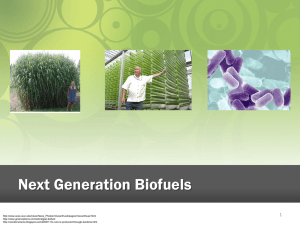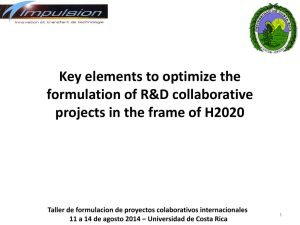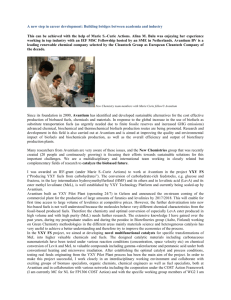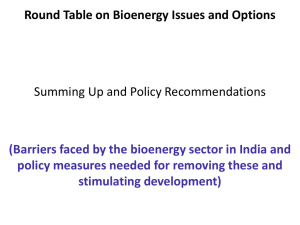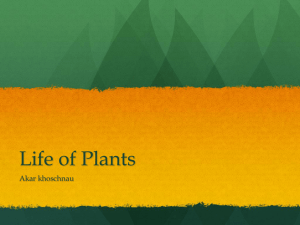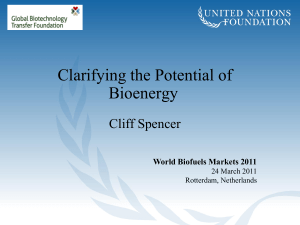Energy 101 Series: Biofuels * more than just corn-based ethanol
advertisement
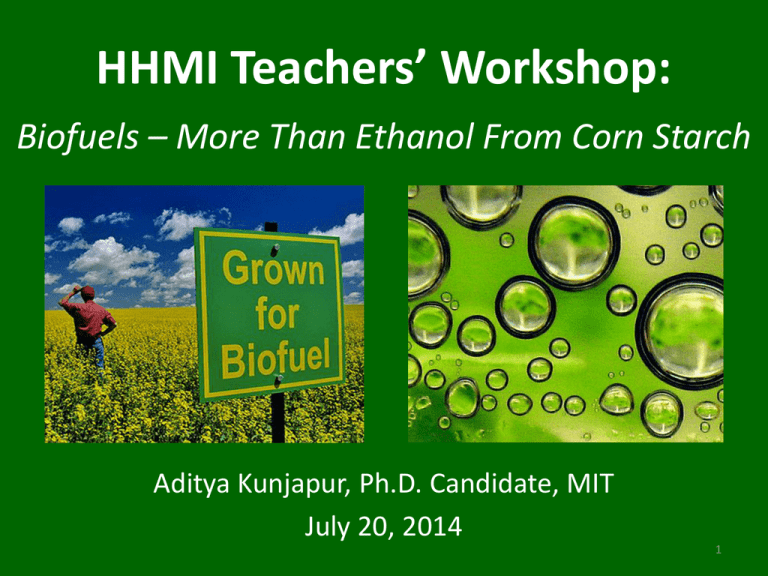
HHMI Teachers’ Workshop: Biofuels – More Than Ethanol From Corn Starch Aditya Kunjapur, Ph.D. Candidate, MIT July 20, 2014 1 Outline • Context for biofuels and key facts • Photosynthesis and carbon fixation • Feedstocks • Fuels • Recap 2 Outline • Context for biofuels and key facts • Photosynthesis and carbon fixation • Feedstocks • Fuels • Recap 3 What is “BioEnergy” According to the International Energy Agency (IEA): “Material which is directly or indirectly produced by photosynthesis and which is utilized as a feedstock in the manufacture of fuels and substitutes for petrochemical and other energy intensive products.” IEA Bioenergy: http://www.ieabioenergy.com/IEABioenergy.aspx 4 Overview of BioEnergy Photosynthesis - Plants - Algae - Cyanobacteria Photons Energy Enzymatic - Same organism - Different organism Fuels or Chemicals Biomass + CO2 Inorganic Molecules Chemosynthesis - Chemolithotrophs (in deep oceans, isolated caves, etc) Energy Capture Thermochemical - Ethanol Biodiesel Jet Fuel Methane - Pyrolysis - Gasification Chemical Conversion 5 Some advantages of bioenergy compared to other renewables • The only renewable source that can replace fossil fuels in all energy markets – in the production of heat, electricity, and fuels for transport (IEA) • The source of a variety of drop-in liquid fuels • The source of petroleum in the first place • The primary way by which atmospheric CO2 is consumed 6 7 Breakdown of US renewables in 2011 4% 13% 35% 5% Hydropower Biomass Wood Biomass Biofuels Biomass Waste Wind 21% Other 22% http://www.eia.gov/totalenergy/data/monthly/pdf/sec10_3.pdf 8 Percentage of the world’s energy • Biomass-based energy accounted for ~10% of world total primary energy supply in 2009 – Includes cooking/heating in developing countries • Global production of biofuels: – 2000: 16 billion liters – 2011: 100+ billion liters • Total road transport fuel globally: 3% – Brazil: 23% Source: IEA 9 Life cycle of traditional biofuels Important consideration: life cycle greenhouse gas emissions SC Opinion on Greenhouse Gas Accounting in Relation to Bioenergy: http://www.eea.europa.eu/about-us/governance/scientificcommittee/sc-opinions/opinions-on-scientific-issues/ Image: http://www.extension.org/sites/default/files/w/2/22/BiofuelLifeCycle.jpg 10 11 Outline • Context for biofuels and key facts • Photosynthesis and carbon fixation • Feedstocks • Fuels • Recap 12 Photosynthesis: Overview • Oxidation/reduction (Redox) reactions – CO2 gets reduced to glucose – H2O gets oxidized to O2 Image: http://www.phschool.com/science/biology_place/biocoach/images/photosynth/photo1.gif 13 Photosynthesis: Inside a Chloroplast Image: http://hyperphysics.phy-astr.gsu.edu/hbase/organic/imgorg/rubc3.gif 14 Photosystems convert light energy into reducing equivalents Image: http://www.biologycorner.com/resources/photosystem.jpg 15 The Calvin Cycle uses those reducing equivalents to turn CO2 into sugar Image: https://benchprep.com/blog/wp-content/uploads/2012/08/Calvin_cycle.jpg 16 17 Typical efficiency of photosynthesis 47% Non-Bioavailable Photons 100% Sunlight 40% Loss in Dark and PhotoRespiration ~5% Net Leaf Efficiency 53% (in 400-700 nm range) 30% Not Absorbed 68% Loss in Conversion of ATP and NADPH to glucose 9% (Collected as sugar) 37% (Absorbed Photon Energy) 24% Wavelength Mismatch 28% (Energy Captured in Chlorophyll) Figure based on statistics listed here: http://en.wikipedia.org/wiki/Photosynthetic_efficiency 18 Outline • Context for biofuels and key facts • Photosynthesis and carbon fixation • Feedstocks • Fuels • Recap 19 Feedstocks Two categories of photosynthetic organisms: 1) Those that capture light energy into non-fuel biomass - Chemical conversion still required 2) Those that capture light energy and produce a fuel - Only physical separation required Image: http://www1.eere.energy.gov/biomass/images/Feedstock1.jpg 20 Estimated corn use for ethanol production (2011): 4.9 billion bushels or 279 billion pounds Image: http://ericpetersautos.com/wp-content/uploads/2012/12/corn-1.gif Source of facts: EIA – Biofuel Trends and Issues – Oct 2012 21 Drawbacks of Corn as a Feedstock • Used for food • Grows slowly • Grows only on arable land • Provides low energy per acre • Is an annual crop Image: http://media.treehugger.com/assets/images/2011/10/bushcorn-jj-001.jpg http://www.shirkebiofuels.com/images/biofuel-feedstock.gif 22 23 Can grow up to 8 feet in 6 weeks Image: http://newswire.uark.edu/images/miscanthus.JPG 24 Energy yield per acre does not favor corn ? Source: “Biodiesel from microalgae.” http://www.sciencedirect.com/science/article/pii/S0734975007000262# 25 Bioreactors/ponds used to grow algae Bioreactors required to cultivate high cell densities Images: http://www.inventgeek.com/Projects/Photo-Bio-reactor-V2/main.jpg http://assets.inhabitat.com/files/bioreactor1.jpg ; 26 Bioreactors/ponds used to grow algae - Algal cells make up very small fraction of pond - Dewatering and processing is cost-prohibitive Images: both from http://www.asulightworks.com/blog/asu-and-ua-team-arid-raceway-algae-test-bed 27 28 Cellulose 29 30 I Gelfand et al. Nature 000, 1-4 (2013) doi:10.1038/nature11811 31 Cellulosic biofuel – a reality? 32 Outline • Context for biofuels and key facts • Photosynthesis and carbon fixation • Feedstocks • Fuels • Recap 33 Pathway to ethanol Under anaerobic conditions (no O2): Glycolysis (~10 enzymatic reactions) Pyruvate decarboxylase Alcohol dehydrogenase Image: http://www.emc.maricopa.edu/faculty/farabee/biobk/alcferm.gif 34 Drawbacks of ethanol • Hygroscopic • Miscible with water • Low energy density • Requires different distribution system than gasoline • Limit to how much can be added to conventional engines 35 36 The E10 “Blend Wall” 37 Alternative fuel options • Longer, branched alcohols • Biodiesel • Methane – Methanogens – CO2 + 4H2 CH4 + 2H2O – Important for waste-to-energy Image: http://canola.ab.ca/image.axd/images/uploads/news/bio_pump_200x250.jpg?m=Crop&w=200 38 Images: (Left) http://www2.raritanval.edu/departments/Science/fulltime/Weber/Microbiology%20Majors/Chpater5/chapter5sub/figure_05_30_labeled.jpg 39 Outline • Context for biofuels and key facts • Photosynthesis and carbon fixation • Feedstocks • Fuels • Recap 40 Overview of BioEnergy Photosynthesis - Plants - Algae - Cyanobacteria Photons Energy Enzymatic - Same organism - Different organism Fuels or Chemicals Biomass + CO2 Inorganic Molecules Chemosynthesis - Chemolithotrophs (in deep oceans, isolated caves, etc) Energy Capture Thermochemical - Ethanol Biodiesel Jet Fuel Methane - Pyrolysis - Gasification Chemical Conversion 41 Recap and take home points • Traditional biofuels have several drawbacks • When evaluating a biofuel process, consider: – Carbon lifecycle – Food versus fuel – Land (or water) required – Feedstock transportation – Desired end fuel • Research efforts directed toward production of advanced and cellulosic biofuels make most sense (just my opinion!) 42 Thank you for listening! Questions? 43
